| Venue: Twickenham Stadium Date: Saturday, 19 November Kick-off: 17:30 GMT |
| Coverage: Live text commentary on the BBC Sport website and app, updates on BBC Radio 5 Live and BBC Sounds |
Ten years ago this autumn, Twickenham celebrated beneath a scoreline as sensational as it was surreal: England 38-21 New Zealand.
The All Blacks rarely lose. The team of 2012, which had won the Rugby World Cup the previous year and would go on to defend their title in 2015, tasted defeat even less frequently.
But England, 9-1 outsiders in a two-horse race, romped home with a 17-point lead. It was the All Blacks' third-heaviest defeat in 109 years of Test rugby. It remains England's biggest ever win over New Zealand.
This is how it happened, and what it meant, from those who played on that extraordinary day.
The build-up
New Zealand came into the game on an unbeaten run of 20 matches, stretching back 15 months. England, attempting to rebuild after a dismal 2011 Rugby World Cup, had won only one of their past six and had been beaten by Australia and South Africa on the previous two weekends.
England full-back Alex Goode: "It was real doom and gloom. Poor Chris Robshaw was captain and had copped it on the chin for not taking the points against Australia and then not going to the corner against South Africa.
"Everyone was hammering him and giving [coach] Stuart Lancaster a lot of heat. I was new into the setup and it was quite tough.
"People were texting me beforehand saying best of luck. I think what they meant, but didn't say, was you are going to need it."
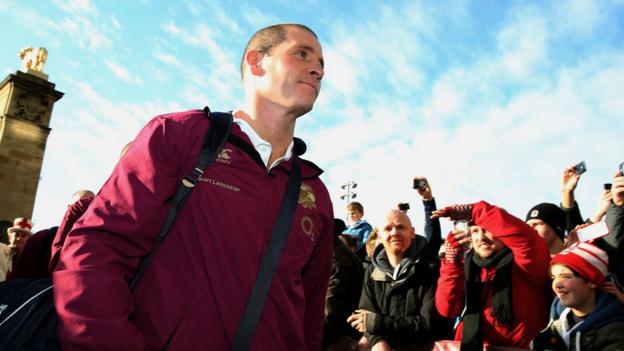
England flanker Tom Wood: "I did some press leading up to the game and it got a fair bit of attention.
"There was nothing contrived about it. I genuinely thought they are just 15 blokes on a patch of grass like any other. There was no mystique to them in my mind.
"No-one admired New Zealand rugby more than me. I spent eight months playing in North Otago back in 2006. Richie McCaw was an absolute hero of mine and I was in real McCaw country. I had played against Kurow, his junior club.
"I guess I got comfortable in that environment and some of that aura that surrounded them was unveiled. I didn't feel like we were any less than them."
New Zealand's preparations for the match had been disrupted by an outbreak of illness among the squad.
New Zealand hooker Keven Mealamu: "We may have encountered that, with the change of food, change of place, but it happens on most tours. It is one of those things that you have to deal with. I wouldn't put the result down to that little virus going round the team.
"We were at our best, but we were against an English side who hit their straps."
Before kick-off
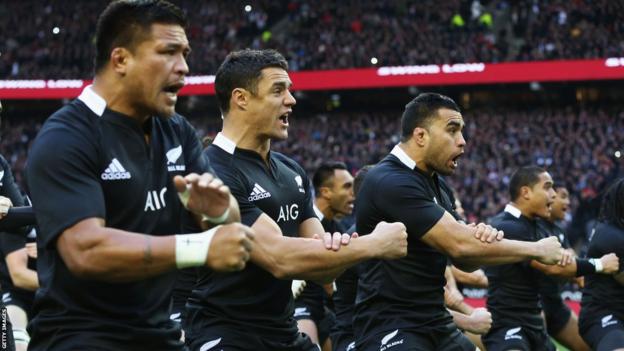
Goode: "There is nothing like the atmosphere when you play New Zealand. The crowd are there earlier and louder, the anthems are up another notch in volume, and then there is the haka."
Seven years before Owen Farrell's mid-haka smirk before the 2019 Rugby World Cup semi-final, Manu Tuilagi, facing New Zealand for the first time, grinned at the opposition as their pre-game ritual came to a close.
England centre Manu Tuilagi: "I loved it, I always will.
"It is amazing to stand in front of the haka. If you go back in time it is a war dance, so to witness it in person is amazing.
"When they are doing it, it is just you and your opposition. It keeps you in that moment."
First half
Owen Farrell's boot was the only source of points in the first 40 minutes. The England fly-half, 21, kicked a penalty with the final act of the half to send his team down the tunnel with a surprise 12-0 lead.
New Zealand full-back Israel Dagg: "I vividly remember Richie McCaw coming up to me under the sticks when Owen was lining up another kick and asking me what I was seeing.
"I was still pretty young [24], only in my second year in the team, I had to say I didn't know what was going on. I was a bit rattled and I think that is what everyone else was feeling.
"We were a bit all over the show because we didn't predict those 'what ifs' - what if England came out and started building momentum and we couldn't get any continuity."
Goode: "Our gameplan was to fly at them. Defensively we wanted to take away time and space. We didn't want to give Dan Carter time to run at the line. We wanted to deny them offloads, stop them using their ball-handling skills.
"You could see it in the first half, they have a few overlaps and they thought they could pass around us, but the boys were flying out the line, hitting everything."
Second half
A fluffed Kiwi catch off the kick-off, a strong England scrum, a penalty awarded by referee George Clancy and, three minutes after the interval, the home side had pushed their lead to 15-0. But then came the comeback. Two tries in three minutes - from wing Julian Savea and number eight Kieran Read - brought the All Blacks sweeping back into the game, just a point behind.
Goode: "We felt good at half-time, but we said in the changing room we had to be wary, that New Zealand could score at any time. And sure enough they did. Twice.
"I'm pretty sure a lot of the boys thought,' blimey, here we go'. You could feel a lull in the crowd too, like they thought it was all too good to be true."
Wood: "To the crowd and the people watching on television, there might have been a sense of inevitability that New Zealand have woken up and were going to take it away from us.
"It almost felt we kind of won it a second time when we took hold of the game again."
One man was key in retaking the initiative. England responded with a three-try blitz in the space of eight minutes, with Tuilagi's power and pace playing a key part on each occasion.
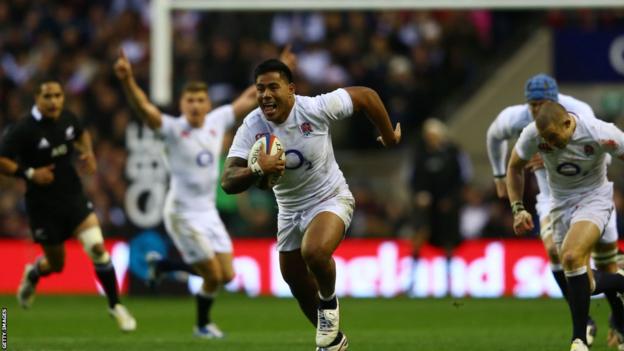
Dagg: "In that period Manu was absolutely destructive - he was ripping us to shreds.
"We knew Manu was the biggest threat beforehand, but we had a couple of the best centres in the game - Ma'a Nonu and Conrad Smith.
"I had so much belief in our midfield, that I didn't expect that from Manu. But he dominated us. Every time he made a break I would have to try and tackle him and I remember thinking, 'if he can run over Ma'a or Dan Carter, what can he do to me?"
Mealamu: "Some days you face an opponent and you see something special. He was ripping through our team throughout the whole day. It wasn't just one instance. He was on fire."
Tuilagi: "It was one of my favourite games.
"It was a whole-team performance. We knew what they were going to bring, but we still had to get our detail right.
"People always remember that game, they always talk about it. Just to be involved is going to be with me forever. I was blessed to be there."
Trailing 32-14 just after the hour, New Zealand could not summon a second comeback. Savea's second score, five minutes short of full-time, would only patch up the scoreline, rather than change the outcome.
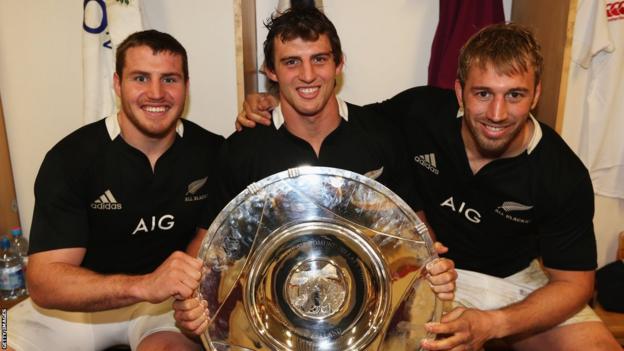
Wood: "My overriding memory is being on the side of the scrum and seeing it dawn on two of the faces of two of my heroes - Richie McCaw and Kieran Read - that they weren't going to win this one, that the All Black surge wasn't coming.
"It felt like I could see the confusion in their eyes. Maybe I was misinterpreting, maybe they would see it differently, but from where I was stood it felt like it was dawning on them that it wasn't their day.
"There was an element of confusion, frustration and uncertainty and to have created that in two greats of the game, in a world-class team, was a real moment of satisfaction."
The aftermath
Dagg: "I remember Brad Barratt, who had had a phenomenal game at 12, singing the room down at the post-match function. He has a wonderful voice on him.
"We were having a beer, licking our own wounds and hating what had gone on. I was thinking we don't ever want to lose to England again because all this singing and chanting sucks!"
Tuilagi: "We went back to the bar back at [team base] Pennyhill Park afterwards. I was on the guitar singing Bob Marley.
"I remember doing Redemption Song. That is how I taught myself to play - Redemption Song videos on YouTube. That is what happens when you get injured a lot!"
Goode: "Poor old Joe Launchbury was in a right pickle.
"Back then, at the end of the autumn, every player who had won their first cap that year would have to have a drink with every other member of the squad.
"Joe, who was making only his second start that day, was like a baby giraffe by the end of the night.
"Manu had the guitar and no-one was going to take it off him, Dan Cole and Tom Youngs were in a corner putting the world to rights and me and Ashy [Chris Ashton] were probably up to no good.
"You don't get loads of time together - six days later I was playing away to Munster in the Champions Cup - but it was a bloody good night.
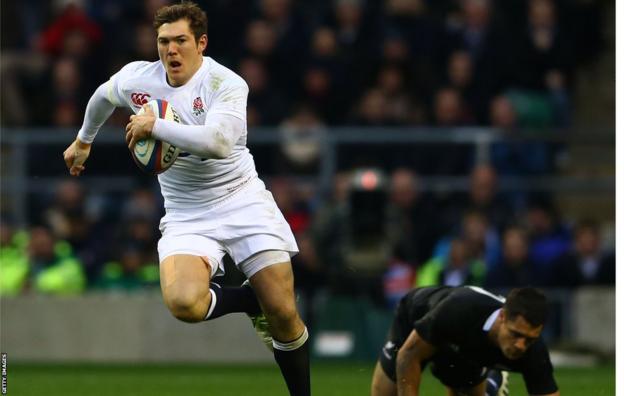
"Looking back on it now, you can see a lot of that team have gone on to be top players and tough competitors.
"Alex Corbisiero, Tom Youngs and Dan Cole is a flipping good and tough front row. Geoff Parling was a serious animal, Joe Launchbury was young and had no fear, Tom Wood and Chris Robshaw were both real battlers, some of the best back rows the Premiership has ever produced.
"Ben Youngs was still pretty young and Owen Farrell, Brad Barratt and Manu is as tough a midfield as you would ever face.
"It was never going to be a team that rolled over easily. But it was not the result anyone expected."
Mealamu: "You think about it for a bit and chew on it, but the learnings you take from games like that are the foundations to your next big goal.
"It was something we thought about and took on board when we came back through England [on their successful World Cup defence] in 2015.
"We took some great learnings from that 2012 game."
What happened next
Alex Goode won the last of his 21 England caps in 2016. He has won five Premierships titles and three European Champions Cups with Saracens, and holds the club record for Premiership appearances. He was named the English top-flight's player of the month for October on Thursday.
Tom Wood, who won the last of his 50 caps in England's 2017 Six Nations success, retired from rugby in June. He runs a woodwork business with former Northampton team-mate Alex Waller and coaches at Bugbrooke RFC. He will make a brief return to rugby when he turns out for the Barbarians against Northampton on Saturday, 26 November.
Keven Mealamu is third in New Zealand's all-time list of cap winners. Since his retirement after 2015 Rugby World Cup success he has run a gym with his wife, and earlier this year was one of the players to come into the Black Ferns camp before their own successful Rugby World Cup campaign.
Manu Tuilagi will line up at outside centre against New Zealand once again on Saturday. Now at Sale, he has played 32 times for England in the decade since, with various injuries preventing him being a consistent presence in the side.
Israel Dagg retired from the game in 2019 at the age of 30 after a long-term knee injury prevented him adding to his 66 All Blacks caps. He has worked as a television pundit since and hosts a breakfast radio show.


Source: BBC Rugby Union News
